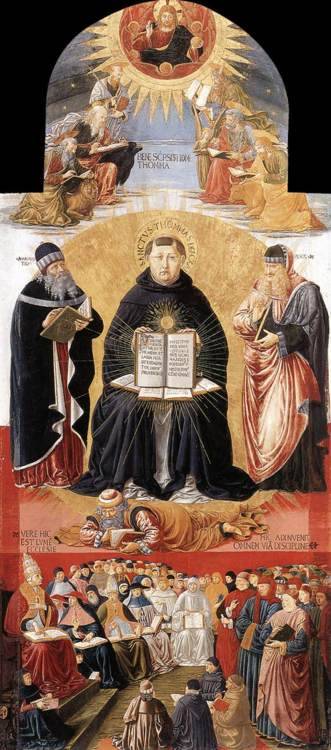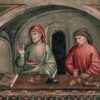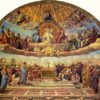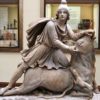【金融の歴史03】高利貸しのタブーが解かれた理由(最終回)
前回、前々回に続き、高利貸しに対する考え方の変化を追っていこう。
金貸しはいかにして罪であることをやめ、社会的信用のある仕事になったのか?
需給の法則を理解していたスコラ神学者は市場価格こそ公正な価格だと考えた
Scholastics understood the power of supply and demand, and argued that the just price was the market price
From the 1100s to the 1500s, clergymen known as the Scholastics debated whether lending was truly sinful.
The Scholastics were the intellectuals of their day. They studied Roman law, Greek philosophy and Arab science at universities in Paris, Cologne, Vienna and others throughout Europe, and included luminaries such as Thomas Aquinas. They wrote and thought with the nit-picking particularity of lawyers. But despite the dry tone, the Scholastics could sound surprisingly like modern economists.
Unlike previous generations of thinkers, who believed that prices should reflect the cost of production, many Scholastics understood the power of supply and demand, and argued that the just price was the market price. In one treatise, the prominent Italian Scholastic cardinal Thomas Cajetan analysed the ethics of how bankers hid interest payments in inflated exchange rates. It was equivalent to a cardinal in 2006 writing knowledgeably about credit-default swaps.
1100年代から1500年代にかけて、スコラ派と呼ばれる神学者たちが、金貸しは本当に罪深い行いかどうかの議論を展開した。
スコラ神学者は当時の知識人の代表である。パリ、ケルン、ウィーンなどの大学でローマの法、ギリシャの哲学、アラブの科学を修めた人たちで、トマス・アクィナスなどの著名人を輩出した。彼らは重箱の隅をつつく法律家のような記述様式と思弁性をもっているが、そのドライな口調の中に、現役の経済学者と見まがうばかりの現代的な主張がちりばめられている。
彼らの先行世代がモノの価格は生産原価を反映すべきだという考えだったのに対し、スコラ神学者は需給の法則を理解し、市場価格こそ公正な価格であると反論した。イタリアの有名な枢機卿トマソ・デ・ヴィオ(Thomas Cajetan、カエタヌスとも)のある論文では、金融業者が水増し価格を通じて金利の存在を隠す仕組みの是非を論じている。たとえていえば、2006年の牧師が内実を百も承知でクレジット・デフォルト・スワップの是非を論ずる芸当だ。
スコラ派の現代的な金融理解
Scholastics also recognised the value of taking business risks. Many of them sanctioned commercial loans to be repaid with a portion of profits. As long as the return was not guaranteed, because the venture could fail or collateral was unavailable, lenders deserved to keep the interest, they said.
Some clergymen also realised that people who lent money were unable to use it on other profitable ventures. This is a very modern justification for permitting interest: opportunity cost. The price of borrowing money reflects the missed opportunity to invest it profitably elsewhere.
スコラ神学者たちは危険負担(ビジネスリスク)の価値についても認識しており、多くの者が、利益の一部を返済に回すかたちでの商業貸付なら許可した。事業は失敗するかもしれないし、担保が使えないかもしれないかもしれない。そのため、返済が保証されないことを承諾するなら、貸し手は利子を受け取る権利があると、彼らは論じたのである。
また、貸し手はカネを貸している間、そのカネを他の有望な事業に回せないこと、いま風に言えば機会損失があることを認識している者さえいた。したがって貸し手にはそれに見合う利子を受け取る権利があるという、すぐれて現代的な考え方である。この考え方に従えば、借入金の値段は、貸し出し行為によって生じる機会の喪失、すなわち他の投資先で得られるはずの利率を反映することになる。
アクィナスの経済思想
The Scholastics took finance seriously, but they always viewed it as connected to the domains of justice and natural law. Aquinas was not interested in narrow questions of maximising utility or channelling individual self-interest, as a modern economist might be; he and his peers wanted to know the just way to distribute wealth and how one could ensure economic exchanges were fair.
In Summa Theologica (1265-74), for example, Aquinas argued that money’s ‘natural end’ or purpose was exchange. Using money to make money, rather than to facilitate the exchange of goods and services, therefore violated natural law. It was akin to selling wine or wheat separately from the right to consume these products ― that is, like selling the same thing twice.
‘To take usury for the lending of money is in itself unjust, because it is a case of selling what is non-existent; and that is manifestly the setting up of an inequality contrary to justice,’ wrote Aquinas.
このようにスコラ神学者たちは財政問題に真剣に取り組んだのだが、彼らの根底には財政を正義や自然法に結びつける見方があった。たとえばトマス・アクィナスの場合、彼は効用の最大化、個人への利益配分といった狭い領域には関心を示さなかった。むしろ彼や彼の同輩たちの関心は富を分配する正しい方法、公正な経済取引の確保などに向けられていた。
主著『神学大全』(1265-74年)においてアクィナスは、貨幣の「自然な帰結先」つまり目的は交換(取引)にあると主張した。財やサービスの取引を促進する代わりに、貨幣を用いて貨幣を殖やすこと(利子を受け取ること)は自然法に反するという論理である。それは、ワインや小麦を消費する権利と、ワインや小麦そのものを分けて売るような行為であり、二重売りだというのだ。
「貸した金のゆえに利子を受け取ることはそれ自体において不正なことである。存在しないものを売ることになるからである。それは明白に正義に反した不平等を設ける行為である」(『神学大全』)。
アクィナスは中世のカトリック世界において理性(哲学)に対する信仰(神学)の勝利を基礎づけたとされる。当時ヨーロッパは先進地域ではなかった。十字軍でアラブ世界の科学・哲学のハイレベルさに驚愕し、すぐさま翻訳を通じてアリストテレスやプラトンの哲学が輸入される。ヨーロッパの知識人の代表である聖職者は舶来思想にかぶれ、そのまま放置すれば神への信仰が形骸化しかねない。その危機に敢然と立ちあがったのがアクィナスだった。
彼は『神学大全』という大著を著わし、アリストテレスの質量や形相といった議論の道具立てを利用しながら、理性に対する信仰の優越を説いた。神の方が理性プラスアルファの領域をカバーできるからエライという理屈である(神が全体集合で理性はその部分集合という関係)。アクィナスの影響は大きく、彼の考えが受け継がれるにせよ、批判されるにせよ、哲学と神学を初めて統合した一大偉人(恩人?)と目されている。
しかし、十字軍が巡り巡ってキリスト教の土台を揺るがすきっかけになったのは皮肉。近代になると理性ベースの哲学と科学が時代精神を形成していく。

かつてはあった金融に関する大所高所の議論
The thinking of the Scholastics and other religious leaders was not all admirable. Some clergy refused to budge from the literal words of the Bible, and others appealed to anti-Semitism to denounce usury. But their conversation represented an informed and influential debate ― at the highest levels of academia and religion ― about the entanglement of ethics, debt, inflation, high finance and monopolies.
Where is that sort of thing today?
スコラ神学者や他の宗教指導者たちの考えが例外なく素晴らしかったわけではない。中には、聖書の解釈を少しでも変えることを拒む者もあれば、反ユダヤ主義に訴えて高利貸しを否認しようとした者もある。しかし、当時の学問と宗教の最高水準において確かな前提知識の上でなされた議論は、倫理学、負債論、インフレ論、大型融資論、独占権など様々な分野にわたって後世に多大な影響力を与えた。
今日、このような大所高所の議論が存在するだろうか?
倫理に中立な現代の経済思想
The Scholastics never resolved their disputes. Instead, they were replaced by new authorities on ethics and finance.
It wasn’t until the rise of neoclassical economics in the 20th century that economics became the supposedly scientific study of self-interest and individual incentives ― a domain in which economists do not pass judgment on actors in the market, any more than biologists would judge the ‘morality’ of bees, or engineers the ‘ethics’ of an aqueduct.
スコラ神学者がすべての論争に決着をつけたわけではない。彼らの議論はやがて後世の倫理学や財政学の権威に取って代わられた。
しかし経済学が利己心と個人の利益を研究する「科学」になったのは、20世紀の新古典派経済学の興隆以降である。生物学者が蜂の「道徳」を問わず、エンジニアが水道管の「倫理」を問わないように、新古典派の学者たちは市場参加者の行いについてニュートラルで、何ら自らの道徳判断を示さないのである。
Of course, people today do discuss the ethics of finance. We debate whether bankers deserve lucrative bonuses; we worry about the moral hazard of bank bailouts; we condemn bankers who sell financial instruments that they know will fail.
But since so much of the language of economics is amoral, and built on the assumption that everyone acts in their narrow self-interest, demanding just outcomes from finance feels like expecting fair results from war. We’ve lost the instinct that finance and debt are moral affairs all the way down, which is something that the Scholastics understood.
もちろん、現在でも金融の倫理についての議論は行われている。バンカーがあそこまで法外なボーナスを貰う資格はあるのかとか、銀行救済はモラルハザードを起こさないかとか、あるいは失敗するとわかっていた金融商品を販売したバンカーは問題ないのかとか。
しかし、今日の経済学の前提には利己的人間観がある。人間なら誰しも戦争の公正な分け前を期待するのと同じ感覚で金融の成果を求める、という暗黙の前提だ。そこにはモラルとは切り離された中性的なことばが行き交うことになる。スコラ神学者は金融や負債の問題が徹頭徹尾モラルの問題だと直観的にわかっていたが、現代人にはその直観が共有されていないようだ。
社会は銀行家の倫理的欠如を責めるが、銀行家は宗教関係者に拒絶されている
The public criticises bankers for their ethical failings, but the bankers too have been failed by our ethical authorities
So what would the Scholastics make of modern finance? Would they admire how efficiently a family’s savings can find productive uses? Or would they decry how developing countries pay more to borrow than rich ones? Would they marvel at our banks’ international reach? Or would they condemn how poor people pay for banking services such as checking accounts that rich people get for free?
スコラ神学者なら現代金融をどう思うだろう?家計の貯蓄が生産的な用途に、いかに効率よく使われているかを称賛するだろうか?それとも途上国が裕福な国より高い金利で借り入れしなければならない現状を嘆くだろうか?あるいは、富裕な国民がタダで使える小切手を、貧しい人は高い手数料を払わないと使えないといって非難するだろうか?
It shouldn’t be so strange for a big bank to hire a theologian such as Miller; what should be strange is that we find it strange. It’s our modern talk of unfettered free markets and shareholder value that’s the anomaly. When Miller talks to bankers and executives, they often tell him that they feel as if what they learn in church or synagogue has no place at work. Even he was embarrassed about using the word ‘calling’ when he told his former co-workers that he was leaving for the seminary.
大銀行がミラーのような神学者を雇うのが奇妙だと感じることはおかしい。それを奇妙だと思う私たちの方が奇妙なのである。規制のない自由市場、株主価値の最大化、そうした近年の話の方が常軌を逸している。ミラーと話すと銀行家や企業幹部は、教会やシナゴーグで学んだことを活かす場所が職場のどこにもないように感じると、よく言うそうだ。ミラー自身、職場の同僚に神学校に行くと告げたとき、「天職」(召命)ということばを使ったが、ばつの悪い思いをしたという。
これも宗教用語。神の呼び出し(命令)を受けて神意にかなう仕事に赴くから「召命」であり、天からそのように指示されたから「天職」なのである。日本語の天職とはニュアンスが異なり、callingは神と人との契約関係に近い。
But neither secular nor religious authorities offer much guidance to bankers trying to link what they do to some kind of ethical tradition. In seminaries and divinity schools there’s a total lack of attention to the economy and the marketplace, Miller says. ‘Clergy may be quick to throw stones at the latest corporate excess on the front pages,’ he told me, ‘but there is not much constructive work.’ The public criticises bankers for their ethical failings, but the bankers themselves have also been failed by our ethical authorities.
しかし、銀行家が少しでも倫理的な伝統に則った金融業務を行おうにも、それを指導してくれる権威は世俗界にも宗教界にも存在しない。神学校やミッションスクールは経済や市場にまったく関心がないのだ、とミラーはいう。「彼らは企業名が新聞の一面に溢れかえる事態をすぐさま非難するでしょうが、建設的な議論はあまり出てきません」。世間は銀行家の倫理的怠慢を責めるが、銀行家は銀行家で宗教関係者に拒絶されているのである。
聖職者の問題意識は古びていない
Anyone interested in reclaiming ethics’ place in the world of finance, however, can build on a several-thousand-year-old foundation. ‘Aristotle, Kant, Bentham ― are they dead people who have nothing of interest to offer?’ Miller muses. ‘Or were they on to something? Our economy would be unrecognisable to them. But the questions are still relevant.’
とはいえ、金融界に倫理の場所を取り戻すことに興味があれば、数千年の基盤があることを忘れないでほしい。「アリストテレス、カント、ベンサム・・・彼らは何ら興味を惹かない過去の人でしょうか?」とミラーは物思いにふけるようにいった、「それとも、何かいいところに気づいていたのでしょうか?彼らは現代の経済を理解できないかもしれません。でも彼らの問いはいまも生きています」。
<記事引用終わり>
金融史を画した利貸しの容認
利子タブーが解除されたのはなぜか?引用記事によれば、本音(資金需要、負債の要請)が建前(金融を卑しむ道徳観、利子タブー)に勝ったという身も蓋もない結論になる。
度重なる戦争が戦費という官の需要を生み、戦争が経済を発達させ民間の資金需要を生んだ。王様や教皇みずからが資金調達に走れば、民間もそれに倣う。そうなれば流れが変わる。こうして、金融はなし崩しに正業化していったというのである。
十字軍の影響
このような流れを促進した契機は十字軍にあったと思われる。その大義はともかく、十字軍はヨーロッパ世界とアラブ世界の交流を促す作用をした。ギリシャ由来の科学や哲学に裏づけらられたアラブ世界の知的興隆に驚き、自らの後進性を自覚したキリスト教徒はギリシャ思想を大量に受容し始める。
ギリシャ由来の理性主義が、神学的世界観で染め上げられていたローマ帝国を襲う。困ったカトリック教会では、たとえばトマス・アクィナスが、理性を神学の下に組み敷く試みを繰り返す。貨幣を交換手段と規定したアリストテレスは、交換を超えて財を殖やそうとするクレマティスティケ(理財)を厳しく戒めていた。金貸しや利子をとることなどもってのほかである。アクィナスはこれ幸いとアリストテレス思想を神学の利子タブーに結びつけたのである。
しかしそれはあくまで思想上の建前であって、現実は違った。世界は着実にルネサンスに向けて動いていた。長い束縛に矛盾と不便を感じていた人々のこころに自由への希求が芽生える。それが交易や金融の発達を促し、神の建前を壊しつつあったのである。やがて北イタリアに金融資本ともいえるメディチ家らが台頭し、世俗権力が教会を凌駕する時代へ移っていくことになる。
こうした一連の世俗化・近代化の流れの中で大きな役割を果たしたのが、次回取り上げるテンプル騎士団である。彼らは潤沢な資金力で銀行のさきがけとなっていった。








ディスカッション
コメント一覧
まだ、コメントがありません